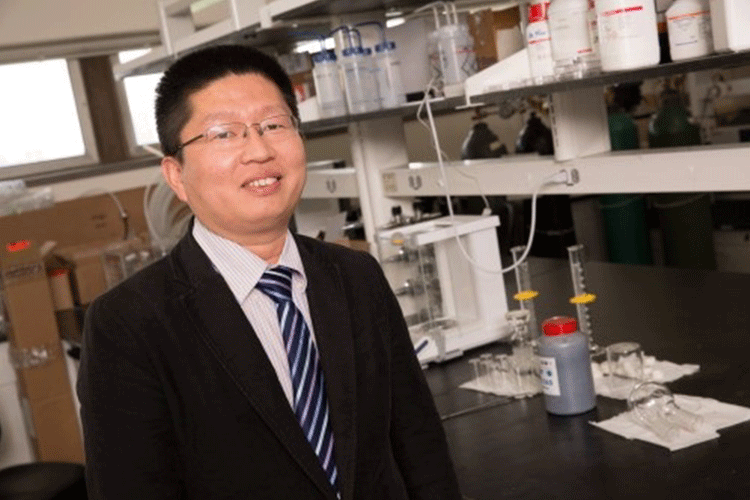In June, Junjie Niu, associate professor, materials science & engineering at UWM’s College of Engineering & Applied Science, received one of UWM’s three 2020 Office of Research/UWM Foundation Research Awards, an honor given to early stage researchers who have shown the potential to achieve distinction in their academic disciplines through scholarship, creative activity, and the dissemination of knowledge. Awardees are selected by a committee of UWM distinguished professors.
Niu and his 12-person research team at UWM are partnering with many Milwaukee-area companies on several projects with the goals of decreasing energy consumption and decontaminating drinking water and water that is discharged from sewage lines into the environment.
In the past five years, Niu has been awarded more than $2.5 million in grants—from federal agencies, local agencies and industries—for research in these areas.
“Worldwide, energy conservation and clean water are the big topics of our time,” says Niu. “My background is interdisciplinary and I combine chemistry, physics and materials science in my research.”
Niu has published two book chapters and more than 80 papers in prestigious journals including Nature sister journals–Nature Nanotechnology and Nature Communications; his work has had a significant influence in the fields of energy storage and water purification.
Improving rechargeable battery life and safety
Niu is investigating longer-lasting, higher-energy, rechargeable batteries. Working with battery companies (including Clarios, which was formerly Johnson Controls), Honda and national labs (including Oak Ridge, Pacific Northwest National Laboratory and Argonne), he is researching the electrochemical reactions of lithium-ion batteries in situ, discerning at the atomic level the fundamental properties of the electrode materials.
This summer, the National Science Foundation awarded him $422,000 for research on lithium-metal batteries. “The rapidly growing demand for large, energy-dense batteries—such as those used in electrical vehicles, power tools and portable electronic devices—is driving research for new electrode materials that can safely deliver higher specific capacity,” Niu says. “Lithium metal contains almost 10 times the capacity of graphite, a currently-used anode material.”
Niu’s battery research has been published in prestigious journals such as Nature Communications, Advanced Materials and the American Chemical Society (ACS) journals Nano Letters and ACS Nano.
Suppressing bacteria, biofilm and heavy metal ions in water
Working with two local companies, Niu is researching biocides capable of suppressing water-borne, toxic strains of E. coli and other bacteria. According to Niu, the biocides that his group is developing contain bio-degradable polymers, which can prevent gram negative (such as E. coli and legionella) and gram positive (such as enterococcus) bacteria from growing on surfaces such as metal, plastic and glass.
The biocides could be used to coat residential water systems (filters and pipes). Application to underwater camera lenses, ship engines and even fish tanks, he says, would prevent biofilm and decrease maintenance costs.
In other research, he is engineering hybrid materials that remove from water several heavy metals (including lead, cadmium, arsenic, mercury and copper), earth metals (including calcium) gases (including chlorine) and viruses.
Provisional patents filed on “smart” self-cleaning coatings
Niu has filed two U.S. provisional patents on hydrophobic and hydrophilic coatings. Three companies have licensed these technologies. His group has received $425,571 of funding for two projects: a hydrophobic grant: $159,807; and a hydrophilic grant: $265,764.
A super-hydrophobic coating, he says, is self cleaning. It repels water and activates when wet. It could be applied to the surfaces of building glass, car windshields, even toilets for example, lessening the need for cleaning and saving energy and water. “A non-flushing toilet would save millions of gallons of water per year,” says Niu, who is working with industry on a coating for ceramic toilets that would negate the need to flush urine.
Removing PFAS and other organic pollutants from water
Working with local agencies such as the Wisconsin Department of Natural Resources, Niu is developing hybrid materials to chemically degrade per- and polyfluoroalkyl substances (PFAS). “My strategy is to develop novel adsorbents that remove short-chain fluorinated molecules and other organic molecules from water,” he says.
PFAS are man-made chemicals that were used in industry and consumer products worldwide starting in the 1950s. Although they were banned by the Environmental Protection Agency, they persist in the environment—meaning they do not break down naturally. Exposure can cause adverse health effects.
Niu’s water research in this area has been published in several prestigious journals such as the American Chemical Society journal ACS Applied Materials & Interfaces.
The Office of Research/UWM Foundation Research Awards
The annual Office of Research/UWM Foundation Research Award—now in their 41st year—are funded by UWM Foundation grants.
This year, Michael Nosonovsky, an associate professor of mechanical engineering at UWM’s College of Engineering & Applied Science, was also recognized for his pioneering work in surface science and friction.
The last College of Engineering & Applied Science faculty member to receive an Office of Research/UWM Foundation Research Award was Ramin Pashaie, associate professor, electrical engineering, in 2016, for his work developing technology to help researchers understand how information processing and blood flow are intertwined.
For information on Niu’s startup company, Niu Energy, click here.
